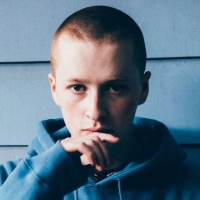 Interview: Sam Gellaitry is your favourite producer's favourite producerBefore his debut Australian tour, we chat to the Scottish XL Recordings signee about his upbringing, synaesthesia, and his debut album.
Interview: Sam Gellaitry is your favourite producer's favourite producerBefore his debut Australian tour, we chat to the Scottish XL Recordings signee about his upbringing, synaesthesia, and his debut album.

City Calm Down Aren’t Disappearing
Ahead of the release of Echoes In Blue – out Friday through I OH YOU – frontman Jack Bourke is as upfront and open as ever.
Header photo by Mclean Stephenson.
“It turned to shit, on April 18th” croons City Calm Down frontman Jack Bourke, his voice reduced to a soft, murmur-like tone thick with sentiment and tenderness. It’s the opening line of the Melbourne four-piece’s second album Echoes In Blue, and for an album recorded in the midst of a hot Victorian summer, it’s remarkably dark and gloomy.
Echoes In Blue is an album that asks as many questions as it answers. The anthemic album highlight In This Modern Land questions the ugly side of digital communication in stripped-back verses and soaring choruses loaded with spiralling guitar melodies. Distraction/Losing Sleep, a relentless track driven by pulsing guitar, highlights the saturation of unintelligent and meaningless drivel that saturates the internet and TV, while later singles such as Blood and I Heard Nothing From You tell stories of heartbreak and hostility. It’s a somewhat solemn listen, but it’s City Calm Down at their best yet – their vulnerability and openness only adding to the incredible songwriting already demonstrated on their debut In A Restless House.
Jack, along with Sam Mullaly, Lee Armstrong, Jeremy Sonnenberg and Northeast Party House member Malcolm Besley (who also aided in the production of In A Restless House), recorded the bulk of Echoes In Blue over two 10-day stretches in February, adding the finishing touches whenever the band found time amongst work and life commitments – typically in the evenings and on weekends away. It was a test of time management, prioritisation and avoiding the exhaustion and anxiety of overworking – things that would end up playing a large part in the album’s creation, particularly as a theme on its leading single, Joan, I’m Disappearing.
Joan, I’m Disappearing is a bleak tale on how overworking can lead to the dissolution of relationships, and although not autobiographical – in fact, Jack and his now-wife married while recording Echoes In Blue – it’s a theme that felt particularly relevant as the band juggled the album’s recording with work obligations and general life. “[Joan, I’m Disappearing] came after a conversation with my uncle last April,” explains Jack Bourke over the phone from Melbourne, two weeks prior to the release of their second album. “He was telling me about a friend of his who had been married for 30 or 40 years and recently got divorced because his wife was fed up with him working long hours. It’s a sad story to write about – a forty-year marriage dissolved over someone’s inability to get home before seven because they were so obsessed with their work. However, at the same time, I was feeling like I just wanted to escape from having to work so much and spend time with my now-wife Jess.”
“You go through phases where you feel like you’re compelled to work really hard,” he continues, his voice becoming more soft-spoken and drawn-out as he recalls his experience working on the album while balancing work and life in general. “Sometimes it feels like you don’t have a choice, but instead more of an obligation. Then, there are other times where you feel like you become addicted to the dizziness or stimulation that this busyness can provide, particularly if you enjoy your work.”
Throughout the creation of Echoes In Blue, Jack became drawn to questioning whether many actually have a choice to remove this busyness from their lives.
Are you actually obliged to keep up with all your responsibilities?
If you attempt to remove this busyness from your life, will you just seek it out anyway?
Between writing and recording Echoes In Blue, touring, working a full-time job and organising a wedding, there were many times when this challenging situation became relevant in his own life. “I was saying to myself ‘I have no choice – I have to do this,’ but I could’ve quit my job, or I could’ve not decided to get married in June last year,” he reflects. “These would’ve been the last things I wanted to do, but I had those options available to me. I just decided to not take them.”

Photo by Mclean Stephenson.
In a 2016 study on mental illnesses in the music industry, English organisation Help Musicians UK found that demanding touring and recording schedules left many musicians exhausted and burnt-out, leading to alarming findings that 71% of musicians experienced anxiety or panic attacks at one point of their career. While the pressure of work, life and recording Echoes In Blue never became unmanageable for Jack, it did affect his wellbeing at the time, and ultimately, influenced one of the album’s most significant messages. “I feel much better now that the record is done, but I do recall going through periods in the middle of last year where I was feeling very anxious. I’ve never felt like that before,” he softly reflects, his voice tinged with bleakness. “I would be sitting at work and every five seconds I would be taking these big deep breaths without even realising it, and my dad suggested that I was probably experiencing anxiety. It really crept on me. When I realised that was happening, I started making an effort to resolve these issues.”
“What I was focused on when I was writing the lyrics of the record was the fact that the circumstance I’m in is not an uncommon one, and from what I understand, it’s becoming more and more prevalent,” he continues, explaining how his experiences with workload-induced anxiety and the feeling of ‘having a choice’ when it comes to your busyness formed the central theme of Echoes In Blue. “People are experiencing this tension in their lives where they’re trying to do so many things, but why? People don’t seem to be coping well, yet at the same time, this obligation to work is also a choice for many people. That’s the line I’m trying to work out through the record. It’s not so much a complaint because each of us has the ability to change and better our situation in some way. But at the same time, it’s very valid for a lot of people – like single mothers working three jobs to make ends meet. It’s not really a choice for them; they’re just sort of stuck in it. It’s a complicated thing, but they really have no choice than to keep grinding through it.”
Across much of Echoes In Blue, City Calm Down’s synth-infused indie sound is marked by a certain vulnerability. Jack Bourke’s vocal trembles as he reflects on fallen relationships, workaholic neglect and other album themes, with City Calm Down’s dynamic instrumentals often swaying between loud and anthemic choruses to soft and quiet throughout the more tender moments. It’s been a tough ride, but it’s also been cathartic – especially for Jack, who learnt how to better balance his time in the midst of one of the busiest times in his life. “It’s been hugely therapeutic for me because I’ve realised I don’t really want to do that again,” he explains. “I don’t really want to be working that hard again. It perplexes me that there are people out there that do want to work that hard and it seems like you miss so many of the enjoyable things about life. It’s not just you can’t go on a holiday or anything because you’re so wound up all the time, but even if you do get to do these things, you don’t feel like you’re present. You’re just thinking.”
“I kind-of observed that about myself and that I became very detached when I was having conversations with people,” he continues, considering how Echoes In Blue’s creation forced him to evaluate his own life. “All I was thinking about was what was going on in my life, and although I’m still doing that a bit at the moment, I have recognised that I do have to change something because it’s not good to be like that. If people want to do that they can go and do that, but I don’t want to. It’s not for everyone.”
Echoes In Blue, City Calm Down's second album, is out through I OH YOU on April 6. Pre-order the album HERE.
City Calm Down Tour Dates:

Follow City Calm Down: FACEBOOK
For advice and support networks for musicians and workers in the music industry struggling with mental health, head to Entertainment Assist and Support Act Australia.
 Interview: Sam Gellaitry is your favourite producer's favourite producerBefore his debut Australian tour, we chat to the Scottish XL Recordings signee about his upbringing, synaesthesia, and his debut album.
Interview: Sam Gellaitry is your favourite producer's favourite producerBefore his debut Australian tour, we chat to the Scottish XL Recordings signee about his upbringing, synaesthesia, and his debut album.
 Interview: Exhibitionist is making beautiful music for a dark and cloudy worldLet Go of Love, the debut EP from Sydney multi-instrumentalist Kirsty Tickle, is out today through Future Classic.
Interview: Exhibitionist is making beautiful music for a dark and cloudy worldLet Go of Love, the debut EP from Sydney multi-instrumentalist Kirsty Tickle, is out today through Future Classic.